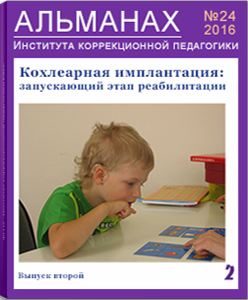Cochlear Implantation: Starting Rehabilitation Stage
Аlmanac #24 · · 2016

"The initial point" of new aural abilities and spontaneous development of the child's speech after cochlear implantation
,
The article presents theoretical substantiation of a change of the existing ideas about the purposes and the content of the professional's work with the child after cochlear implantation. There is considered the initial point of new aural abilities and spontaneous development of the child's speech after multichannel cochlear implantation.
Keywords
"The initial point" of new aural abilities and spontaneous development of the child's speech after cochlear implantation
Deafrehabilitation
approach
normal ontogenesis
emotional interaction
children with cochlear implantation
cochlear implantation.
Normal affective development of a child: During the first year of life
The article gives an idea of the most significant phenomena and stages of the child's affective development during the first year of their life, whose content is considered as a gradual formation of the common/shared experience of the child with their close adult; the significance of the shared experience in development of the psychical functions, activity and achievements of the child during their interaction with the environment is analyzed.
Keywords
Normal affective development of a child: During the first year of life
Early affective developmentemotional contagion
interaction with mother
common/shared experience
mental development.
The initial stage of rehabilitation of the child with cochlear implantation: Four work sessions of the teacher of the deaf
The article considers the initial stage of rehabilitation of a child after cochlear implantation. Four work sessions of the teacher of the deaf at the initial rehabilitation stage are presented for the first time; their tasks, content and the indicators of completion of the each session and the stage as a whole are presented.
Keywords
The initial stage of rehabilitation of the child with cochlear implantation: Four work sessions of the teacher of the deaf
Deafdialogue
comprehensive sensory basis of dialogue
emotional interaction with relatives
understanding of speech
spontaneous development of speech.
Characterizing the readiness of children with cochlear implantation for school education, depending on completeness of the "initial" rehabilitation stage
,
The article presents the results of the comparative experimental and psychological investigation of components of psychological readiness for school education, depending on completeness of the "initial" stage of rehabilitation of the children with cochlear implantation. The importance of the speech development level before the hearing loss and the deafness duration for going through the "initial" rehabilitation stage was confirmed during the study. It was determined that if the "initial" rehabilitation stage has not been completed, the child demonstrates an insufficient psychological readiness for school education and essential difficulties in development of their natural speech and communication.
Keywords
Characterizing the readiness of children with cochlear implantation for school education, depending on completeness of the "initial" rehabilitation stage
Cochlear implantationpreschoolers
psychological readiness for school education
"initial" rehabilitation stage.
School age children with cochlear implantation: Four development histories
, ,
The article presents successful and unsuccessful development variants of the children after cochlear implantation. By giving examples of the real children's cases, a very important range of distinctions in the children's development after the implantation is presented: from achievement of the high age norm and the ability to study at the main stream school as an equal with hearing peers to a serious lagging behind of not only age norm, but also of the development level of specially educated deaf peers. It is demonstrated that incompleteness of the initial rehabilitation stage after cochlear implantation makes impossible development of the child as a hearing one and their comprehensive socialization impossible.
Keywords
School age children with cochlear implantation: Four development histories
Deafnesshearing impairment
initial rehabilitation stage
transition to the way of natural development of communication and speech
normal development level
prospects of approach the age norm
Cochlear implantation services for children of deaf parents
The article describes the experience of cochlear implantation (CI) centers in Germany and also some results of the pilot investigation in the field of studying of the cochlear implantation centers' patients, conducted in the University of Munich.
Keywords
Cochlear implantation services for children of deaf parents
Children with hearing disordersdeaf parents of children with hearing disorders
cochlear implantation
Germany
pilot study.